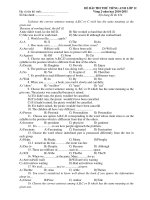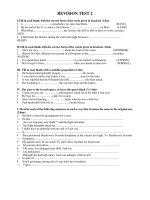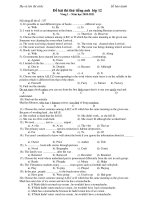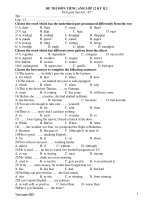- Trang chủ >>
- Đề thi >>
- THPT Quốc Gia
ĐỀ THI THỬ TIẾNG ANH lớp 12
Bạn đang xem bản rút gọn của tài liệu. Xem và tải ngay bản đầy đủ của tài liệu tại đây (96.69 KB, 3 trang )
ĐỀ THI THỬ TIẾNG ANH
I. Fill in each numbered blank with one suitable word or phrase from the box: (2ms)
Sometimes people add to what they say even when they don’t talk. Gestures are the “silent language” of every
culture. We point a (1) or move another part of the (2) to show what we want to say. It is important to know the
body language of every country or we may be (3) In the United States, people (4) each other with a handshake in a
formal introduction. The handshake must be (5) If the handshake is weak, it is the sign of weakness or (6) Friends
may place a hand on the other’s (7) or shoulder. Some people, usually women, greet a friend with a (8)
ANSWER
(1) (2) (3) (4)
(5) (6) (7) (8)
II. Choose the word whose underlined part is pronounced differently (1m)
1. A. originated B. needed C. encouraged D. eliminated
2. A. killed B. enjoyed C. described D. digested
3. A. miles B. attends C. drifts D. glows
4. A. books B. dogs C. cats D. maps
III. These are incomplete sentences. Circle A, B, C or D as the best choice to complete each sentence. (3ms)
5. Our parents join hand to give us a nice house and a happy home.
A. deal with B. manage C. help together D. work together
6. An Indian woman has to more in a marriage than a man.
A. determine B. sacrifice C. effort D. do
7. Tom: “How do you do?” - Jerry: “ ”
A. Yes, OK. B. Not too bad C. How do you do? D. I’m well
8. David: “Happy Christmas!” - Jason: “ ”
A. The same to you B. Happy Christmas with you! C. You are the same D. Same for you!
9. Before cars , people horses and bicycles.
A. were discovered/ had used B. discovering/ had used C. had discovered/ used D. discovered/ had used
10. the firemen arrived to help, we had already put out the fire.
A. Until B. No sooner C. By the time D. After
11. I have earn my own living I was seven.
A. Since B. When C. While D. As soon as
12. , Peter came to see me.
A. While having dinner B. While I was having dinner C. When having dinner D. When I am having dinner
13. Can I borrow your bike on Monday? – I’m sorry, but it.
A. I’ll be using it B. used C. use D. have used
14. By the end of this year, my father in this company for 10 years.
A. has been working B. has worked C. will work D. will have been working
15. “Don’t forget to go to the supermarket after work”, he said.
A. He requested me not forget to go to the supermarket after work.
B. He asked me not to forget to go to the supermarket after work.
C. He reminded me to go to the supermarket after work.
D. He told me that I shouldn’t forget to go to the supermarket after work.
16. “How much did you drink at the party last night?”
A. They asked him how much did he drink at the party last night.
B. They asked him how much I drank at the party the night before.
C. They asked him how much I had drunk at the party the night before.
D. They asked him how much he had drunk at the party the night before.
IV. Each sentence has four underlined words or phrases marked A, B, C and D. Circle one underlined word or
phrases that must be changed in order for sentence to be correct (1m)
17. It’s the first time I saw this film.
A B C D
18. My brother hasn’t played football for last year.
finger exchange greet misunderstood make firm verbal hug arm body unfriendliness friends
A B C D
19. She usually has a glass of milk after breakfast, but now she drinks a cup of coffee.
A B C D
20. He said that he will be there again the day after.
A B C D
ANSWER
Question 1 2 3 4 5 6 7 8 9 10
Answer
Question 11 12 13 14 15 16 17 18 19 20
Answer
HS A&B:
V. Rewrite these sentences without changing the meaning: (1m)
1. I haven’t been to the cinema for two years.
The last time
2. “You stole the money, Joe, didn’t you?” said the inspector.
The inspector accused
VI. Making a sentence from the words provided: (1m)
1. If you/ invited to someone’s house in America/ dinner, you should bring/ gift, such as a bunch/ flowers.
2. It/ difficult/ arrange a date/ was convenient/ everyone.
HS A1&D:
V. Rewrite these sentences without changing the meaning: (1m)
1. I haven’t been to the cinema for two years.
The last time
2. “You stole the money, Joe, didn’t you?” said the inspector.
The inspector accused
3. When you phoned me, it was my lunch time.
When you phoned me, I
4. “Sue, can you remember to buy some bread?” said Paul.
Paul reminded
VI. Making a sentence from the words provided: (1m)
1. If you/ invited to someone’s house in America/ dinner, you should bring/ gift, such as a bunch/ flowers.
2. It/ difficult/ arrange a date/ was convenient/ everyone.
3. Body language/ form/ non – verbal/
4. It is all right/ point/ thing but not at people/ the hand/ index finger.
KEY
Question 1 2 3 4 5 6 7 8 9 10
Answer C D C B D B C A A C
Question 11 12 13 14 15 16 17 18 19 20
Answer A B A D C D C C D B
V.
1. The last time I was to the cinema was two years ago.
2. The inspector accused Joe of stealing the money.
3. When you phoned me, I was having lunch.
4. Paul reminded Sue to buy some bread.
VI.
1. If you were invited to someone’s house in America for having dinner, you should bring a gift, such as a bunch of
flowers.
2. It was difficult to arrange a date which was convenient for everyone.
3. Body language is a form of non – verbal communication.
4. It is all right to point at things but not at people with the hand or index finger.









